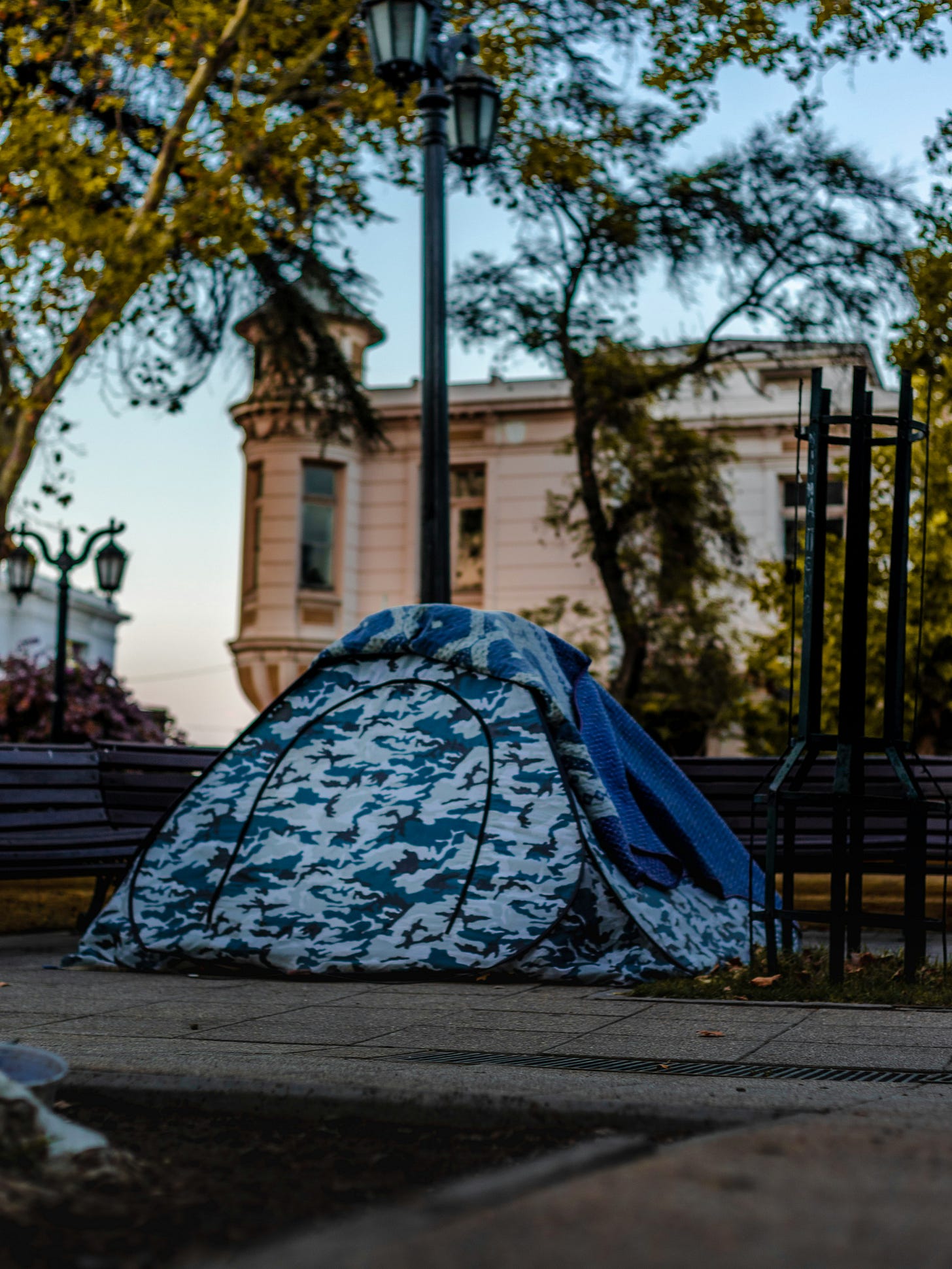If you’ve been reading my work for long, you might know about the recent tension between my landlady and me. I’ve been here for fifteen years, and my rent has never been even a day late. On Sunday the owner tipped her hand.
She’d forced me to sign a very detailed and (IMO) ridiculous paper with all sorts of property demands. No more than three bags of recyclable cans and bottles at any one time on the property. We had to cut down the sturdy wheel swing the neighborhood kids loved. She wanted soil hauled from the side to the back yard—which she admitted would cost her hundreds of dollars to hire out.
At the end of this stressful inspection, my daughter asked her real intentions. I was feeling powerless, knowing my life was in this lady’s hands. My entire family and I stood there, storm clouds rolling in, and waited for her reply.
That taste of powerlessness left me feeling guilty and ashamed. Raised as a middle-class kid from mid-twentieth century America, I thought that even though disabled, if I did well in school, went to college and planned wisely, I’d live the American Dream. I’d get married, have kids, buy a house and wind up better off than my parents.
Except that it didn’t happen, and not only for me.
Sure, some boomers are well-off, having negotiated the path to self-sufficiency. I don’t begrudge anyone’s success. But as we face the biggest upheaval of society in my lifetime, I keep coming back to the same question: how did so many wind up so powerless?
Millions of us never got to be homeowners or we crashed and lost them in the Great Recession of 2008. Now we’re dog paddling as rents soar and housing is unaffordable for so many. In a sense, I feel guilty for complaining—houseless folks would love to have a place to lay their heads. Are they all neer-do-wells, addicts, alcoholics and lazy as heck?
Tell the couple living on a busy corner, their tent flapping in the wind, to leave their meager possessions and go get a job. Or say that the old vet with a leg missing as he holds his sign is a lazy leech.
What about folks who work multiple jobs but still need food stamps or Medicaid to get by? The parents of a disabled child who needs constant nursing care? Are all these people unworthy of our compassion? Should they pull themselves up by their bootstraps?
The recent government cuts seem to thumb a nose at the powerless.
The people with the least will pay the most.
Those who insist that social safety nets are communism, socialism, Marxism or only helping lazy folks who want freebies are throwing out stereotypes so they don’t have to look me in the eye: A disabled senior widow who’s worried about the future of Social Security, Medicare and the VA.
Tens of thousands of government employees are fired, saying it’s about “waste, fraud and abuse.” Even Meals on Wheels isn’t safe.
If the current firings and cuts continue, who will feel the impact most? Seniors, the disabled, widows and veterans, for starters. Folks a lot like me. Because those who would rob us of power always start with the low-hanging fruit—the people with the least but who will pay the most.
I’m not sure how those who support the current atmosphere can square their allegiance with Jesus’ actual words. We’d all do well to study how Jesus was nonviolent in a time of empire, how he resisted Caesar by advocating for orphans, widows, the least of these.
Still, there’s hope. This week, Senator Cory Booker (D-NJ) spoke for more than twenty-five hope-inspiring hours, to remind us, as the late John Lewis said, “to get in good trouble, necessary trouble.” Protests are erupting, town halls are demanding power be given back to us, the people.
Across our nation, people are speaking up, voting to restore sanity to our country. That gives me courage to rediscover my own power.
As I stood outside the house I’ve loved for fifteen years, I tried not to look at the tulips I planted, the red brick path I’ve weeded every spring.
The homeowner finally spoke. She’s thinking of remodeling a bathroom so that she can charge the highest rent possible. Of course, we’d be evicted during the remodel, and I can’t afford, on Social Security and a small VA pension, to pay what she intends to ask.
I felt my power drain away.
But somehow, love recharged itself that day, and I remembered that power is perfected in weakness. I may not have chosen to find a new place to live, but I do choose to reclaim God’s love as my power—the power to change, the power to trust God’s love in my next chapter, the courage to remain compassionate. Link arms with me as we fight for widows, orphans and those who need a place to lay their heads.













Oh Pam,
I won't lie--it's stressful, sad and I'll grieve leaving this place (I've lived in these same blocks since 1989). The neighborhood is full of little midcentury homes and wonderful old maples, firs and other trees. Even some sequoias. I am nuts--I talk to them and they talk to me. They urge me to keep caring, keep loving, keep advocating for those who need help. Thank you for your lovingkindness. On a different note, I suddenly put together "Joe" and "Mulcaire." Is this the same guy from Cortez who graduated in 1968? I have that yearbook. Much love to you, Linda
You have rights! It will be worth the money to consult a lawyer who specializes in landlord-tenant rights. I bet the owner won't be able to raise your rent more than a specified and controlled percentage each year. Reading your description also made me think she's asked you to do things that you legally don't have to do and certainly not without written, not verbal, notice. Please don't accept this lying down!